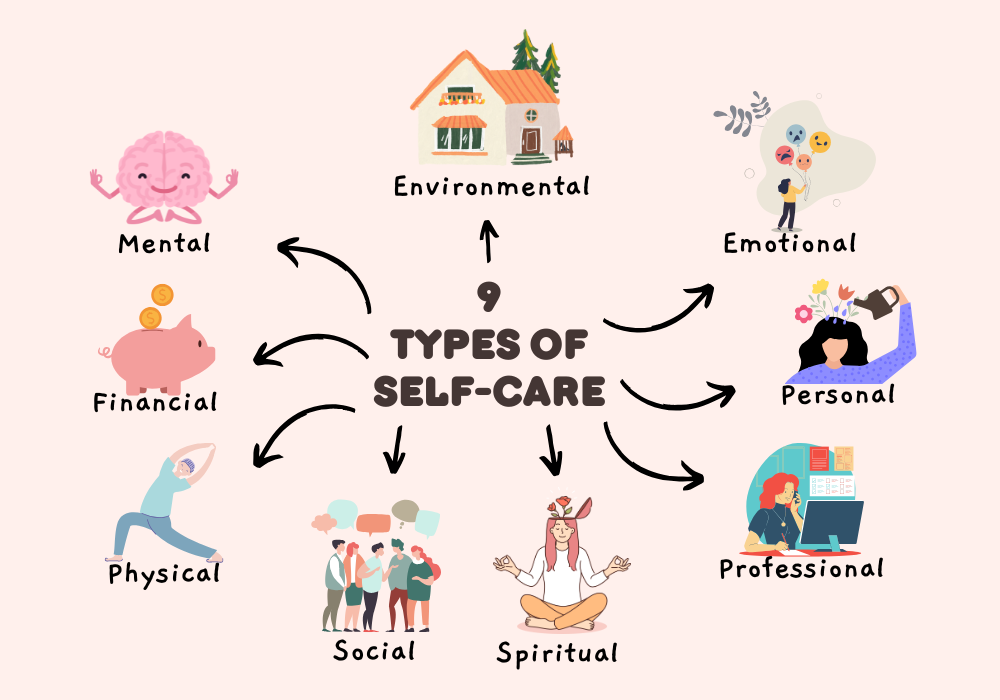Self-care is an essential practice for keeping your body, mind, and emotions in balance. It means intentionally prioritizing your own needs to support a healthy, well-rounded life. Practicing self-care can improve your quality of life and help build resilience to handle challenges.
In today’s fast-paced world, 83% of Americans suffer from work-related stress, but what if you had a practical framework to combat burnout? This isn’t just another self-care article—it’s your roadmap to building sustainable habits across all 9 essential types of self care. Whether you have 5 minutes or 50, these evidence-based practices will help you reclaim balance and prevent burnout starting today.
✨ 9 Self-Care Types – 5-Minute Quick Start
Too busy? Try one from each category:
Small consistent actions create big well-being changes over time.
What is self-care:
Self-care is all about intentionally prioritizing your health and happiness—mentally, physically, and emotionally. It includes activities that help you relax, recharge, and restore your energy, making it easier to handle life’s daily challenges. This can involve physical exercise, nutritious eating, and mental practices like meditation, journaling, or mindfulness.
In our fast-paced lives, we often find ourselves constantly on the go, juggling busy schedules, social pressures, and work commitments. It’s easy to get lost in this endless sea of responsibilities, leading to burnout, stress, and feeling disconnected. Self-care helps us regain balance and well-being, offering a pathway back to a healthier, more centered life.
why is self care important?
Self-care is essential because it makes life easier, healthier, and happier. Practicing self-care has both immediate and long-term benefits that improve well-being. In the short term, it helps reduce stress, boosts confidence, and creates a sense of belonging, like a mini recharge that leaves you feeling valued and connected. Over time, self-care becomes even more valuable as it helps manage stress and anxiety, lowers the risk of illness by promoting healthy habits, and strengthens relationships. It also helps you handle challenges more easily and can make you feel more fulfilled at school or work. By taking care of yourself, you’re building a stronger, healthier, and more positive life.
What are the 9 types of self care?
Self-care means taking steps to care for your physical, mental, and emotional well-being—think of it like recharging your batteries. When we skip self-care, it’s easy to feel overwhelmed or burnt out. But by making time to nourish ourselves, we build resilience, stay balanced, and feel more ready to handle life’s challenges. Here are some different types of self care and simple ways to bring each one into your life.
1-Mental self-care:
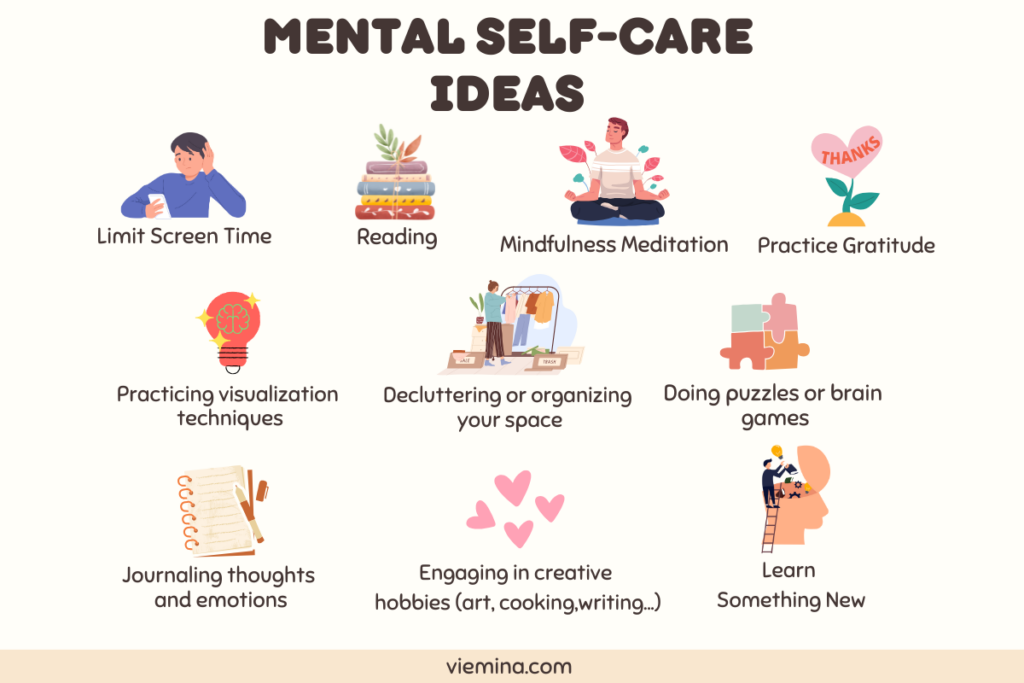
Mental self-care is all about keeping your mind focused, stimulated, and engaged. Doing things like reading, solving puzzles, learning something new, or practicing mindfulness can boost your mental clarity and even improve your outlook on life. These activities help your mind stay strong and can also lift your mood and reduce stress. Taking care of your mental health this way is key to feeling balanced and more satisfied in life.
Related:How To Improve Mental Clarity ? 16 Ways to Achieve It
Related: 10 Effective Techniques to Reduce Stress
2-Financial self-care:
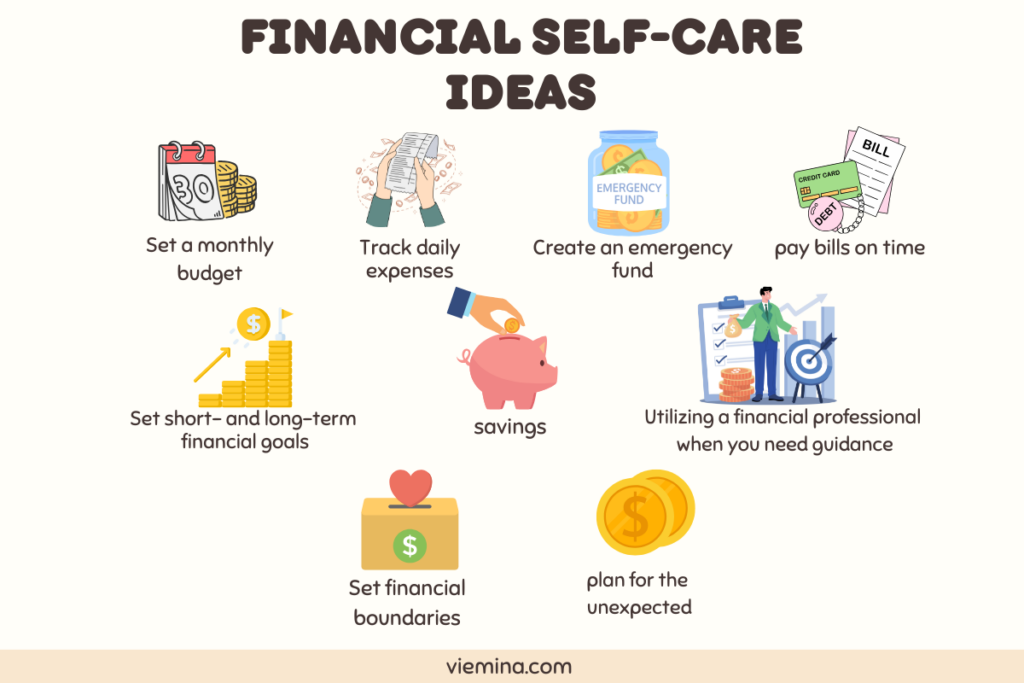
Handling money wisely can really help reduce stress and build a feeling of stability. Financial self-care means not just making a budget but also setting aside savings and planning for future expenses. By taking a proactive approach to managing money, you can feel more secure and at ease. These steps help create a healthier, more positive relationship with finances, which can boost overall well-being and peace of mind.
Related: 10 Money Management Tips to Improve Your Finances
3-Social self-care:
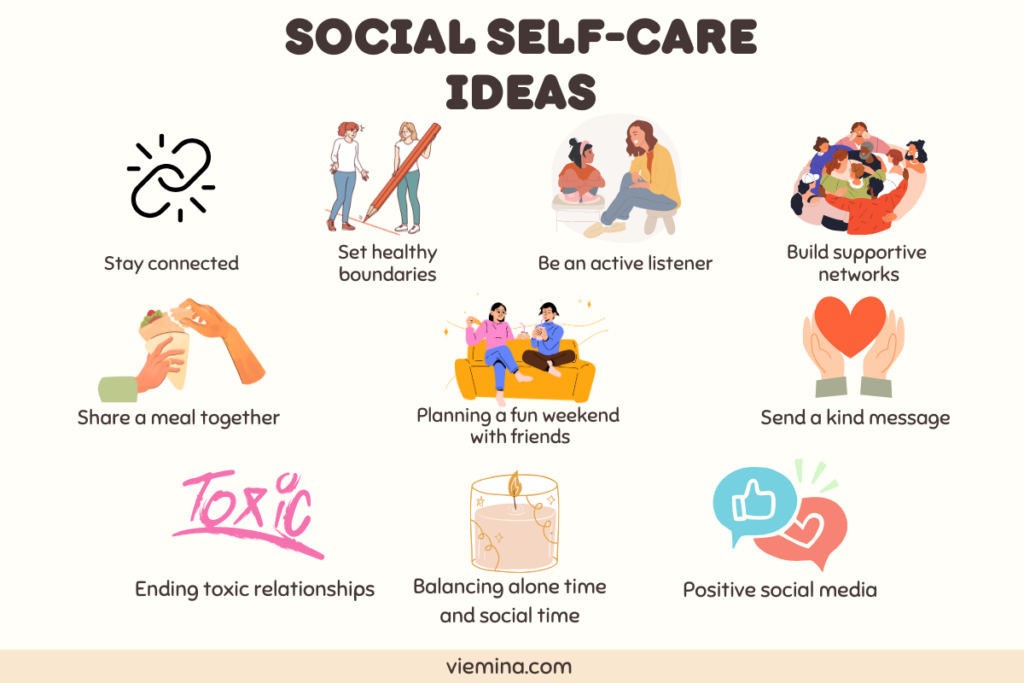
Self-care isn’t just about spending time alone; “social self-care” is all about building and keeping healthy relationships with the people around you. Staying connected with friends and loved ones can make you feel valued and less lonely, while also helping to improve your communication skills. Reaching out to old friends or showing appreciation to those around you are great ways to practice social self-care. Enjoying these interactions can boost your happiness and well-being!
Related: How To Maintain Lasting and Strong Friendships: 10 Tips
Related: Living alone: 12 Tips for a Smooth and Enjoyable Transition
4-Physical self-care:
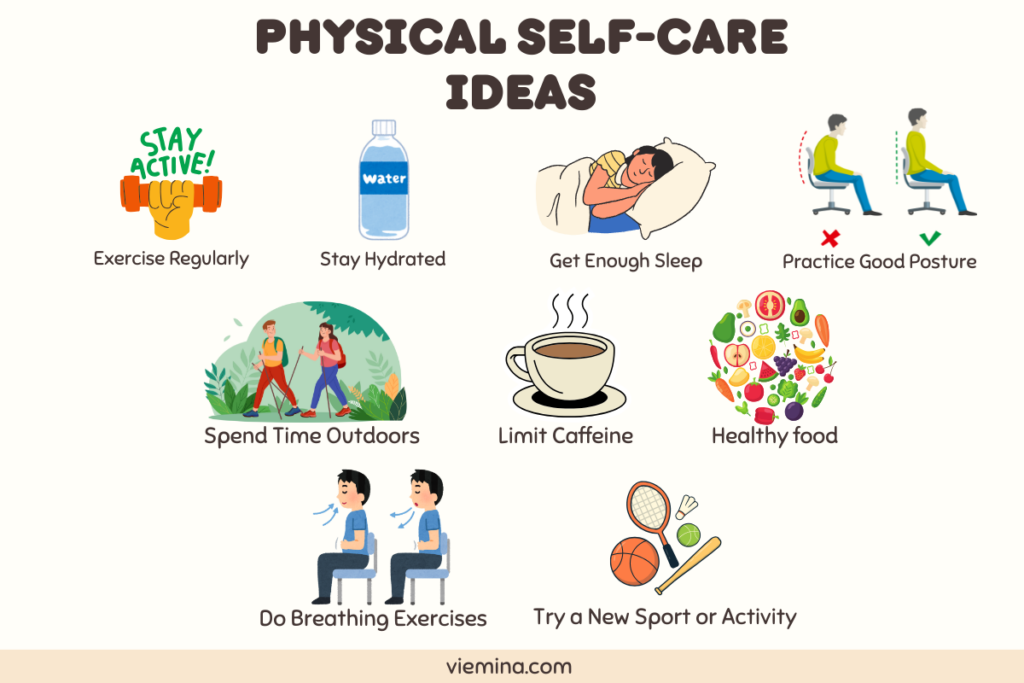
Physical self-care is all about taking care of your body to feel your best. This includes things like getting regular exercise, eating balanced meals, getting enough sleep, and visiting doctors for check-ups. When you keep up with these habits, you’re helping your body stay strong, your mind feels clear, and your overall health improves. Making time for physical self-care can help you feel more energized, prevent health issues, and improve your quality of life.
5-Emotional self-care:
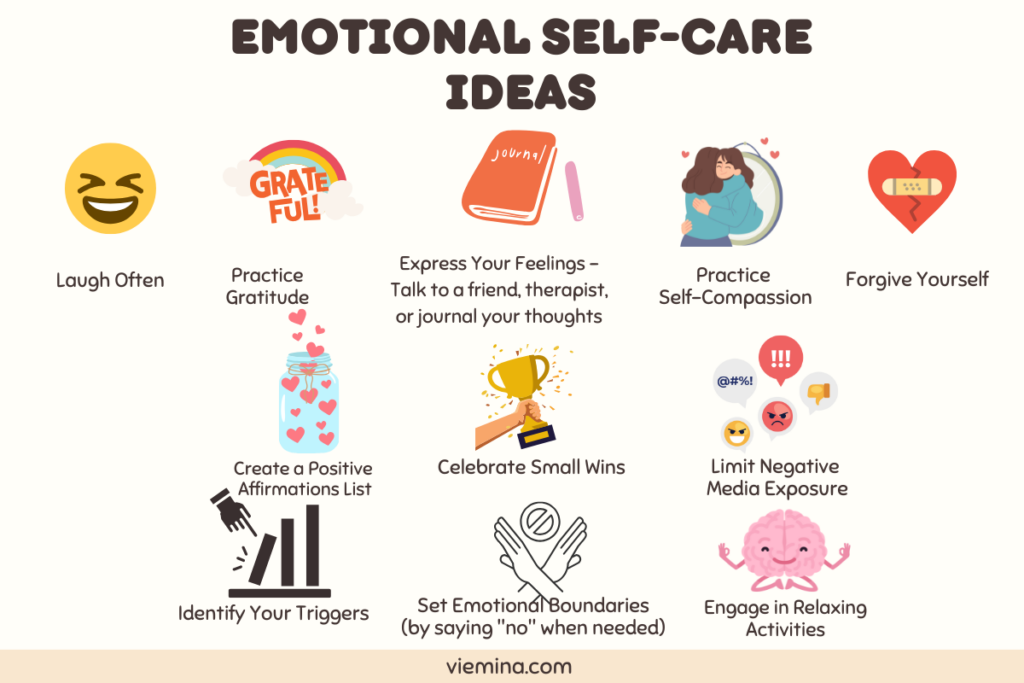
Dealing with emotions can be difficult, yet it is crucial for maintaining overall health and well-being. This important form of self-care entails recognizing, processing, and positively articulating emotions. Engaging in activities such as writing in a journal, having meaningful conversations with a reliable friend, or participating in therapy sessions can be incredibly beneficial. These practices aid in developing emotional resilience, equipping individuals with the tools they need to navigate life’s challenges effectively and help to avoid the negative consequences of emotional accumulation over time.
Related: Negative Emotions: 11 Expert Tips for Emotional Acceptance
Related: How to Find Emotional Healing? 10 Powerful Tips
6-Spiritual self-care:
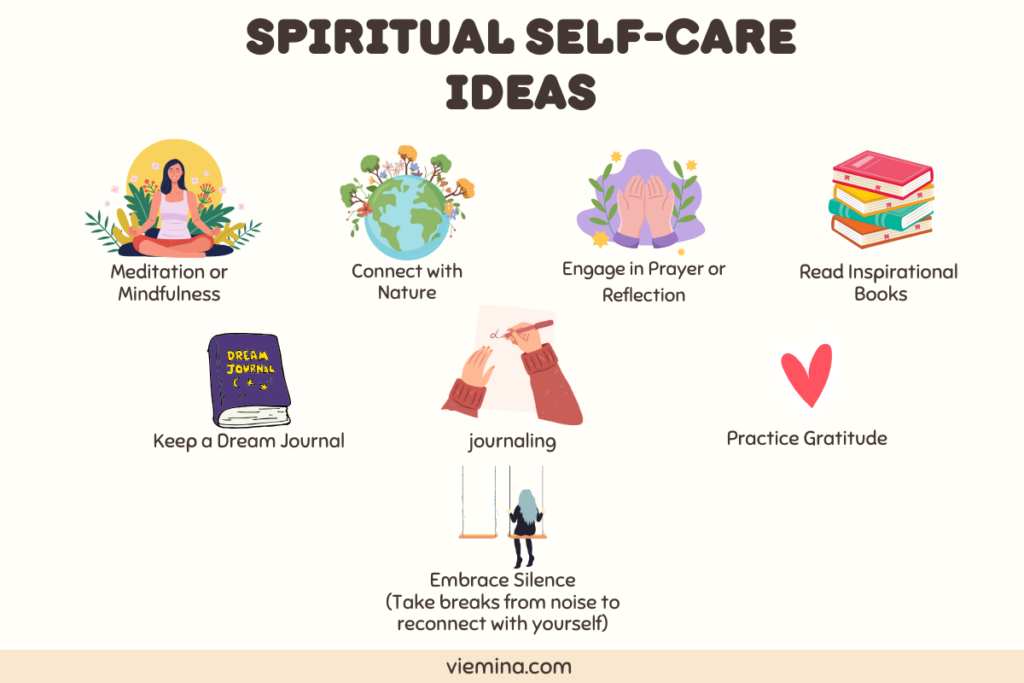
Spiritual self-care doesn’t have to be linked to religion; however, it can be if you genuinely appreciate and value that specific form of spiritual bond. Regardless of one’s beliefs, spiritual self-care involves engaging deeply with your inner self and discovering a richer, deeper sense of meaning and purpose in life. Meditation serves as a potent and transformative activity in this realm, providing an invaluable opportunity to calm the mind, reflect, and link with a higher purpose. This important facet of self-care involves pursuing greater significance, fulfillment, and connection in our lives, in whatever way that might uniquely manifest for each individual.
7-Professional self-care:
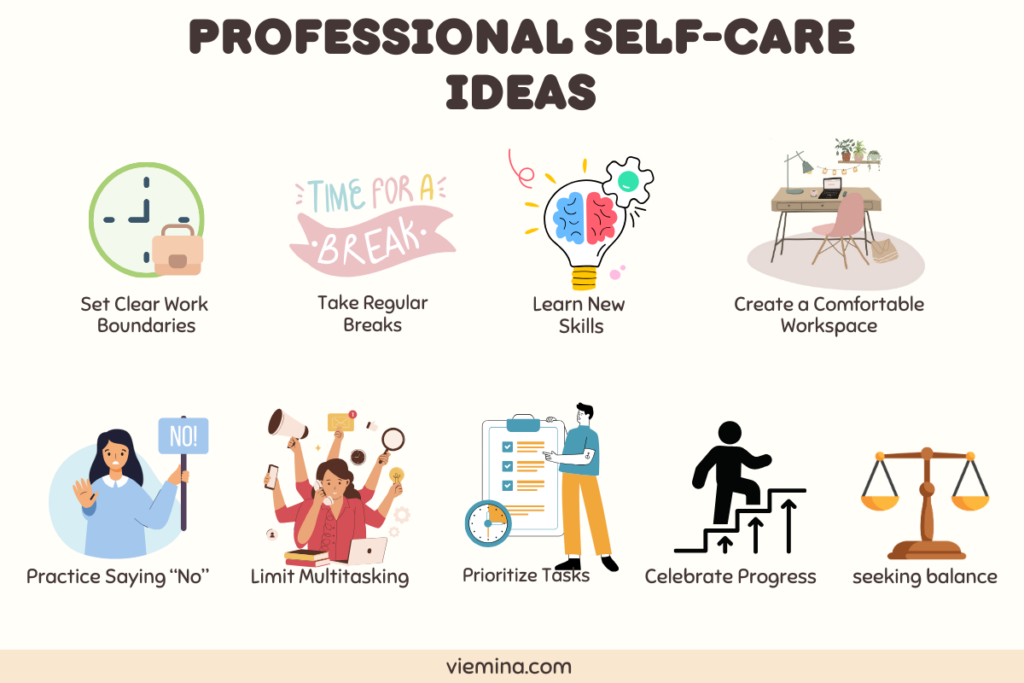
Professional self-care means finding a healthy balance between work and personal life so you don’t feel overwhelmed. This could mean taking breaks during the day, asking for help when needed, and setting boundaries between work and your free time. It also involves setting realistic goals and learning to share tasks with others. Practicing professional self-care can make work feel less stressful, improve how you feel about your job, and help you stay energized and happy.
Related: How to Maintain a Healthy Work-Life Balance In 19 Tips
8-Environmental self-care:
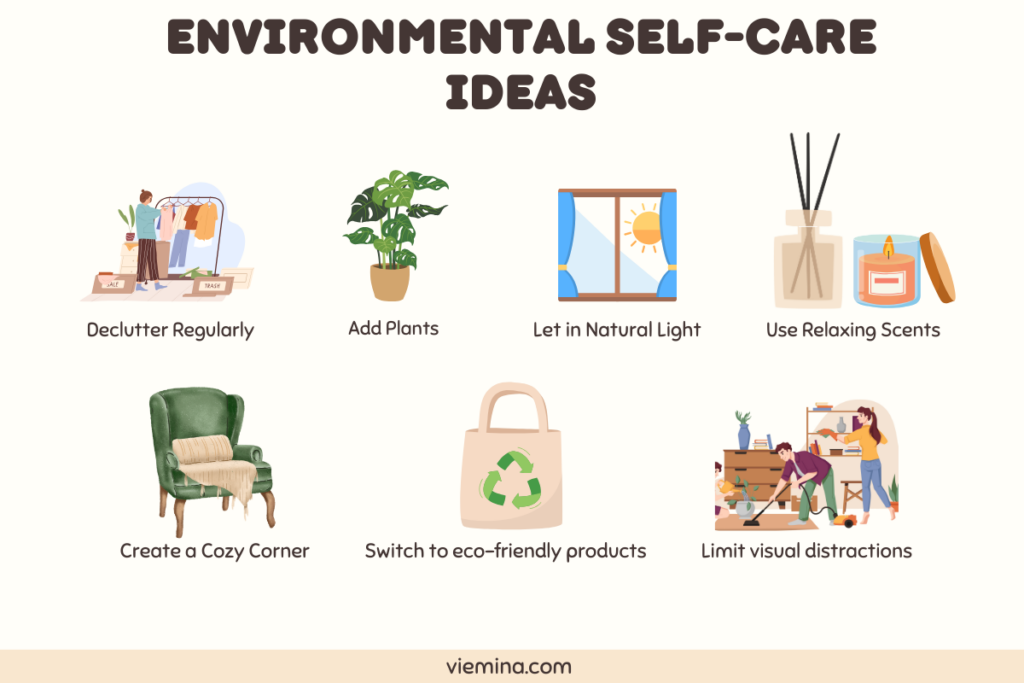
Environmental self-care means creating spaces that make you feel good and help you stay healthy. Start by decluttering and organizing your room or workspace to keep things calm and stress-free. Add some plants, wall art, or personal touches to make the space feel inviting and comfortable. Spending time in nature, even a short walk in the park can help you feel connected, refreshed, and more relaxed. Make sure your environment is safe and healthy too—keep the air clean, minimize exposure to chemicals, and set up your space to inspire and relax you.
9-Personal self-care:
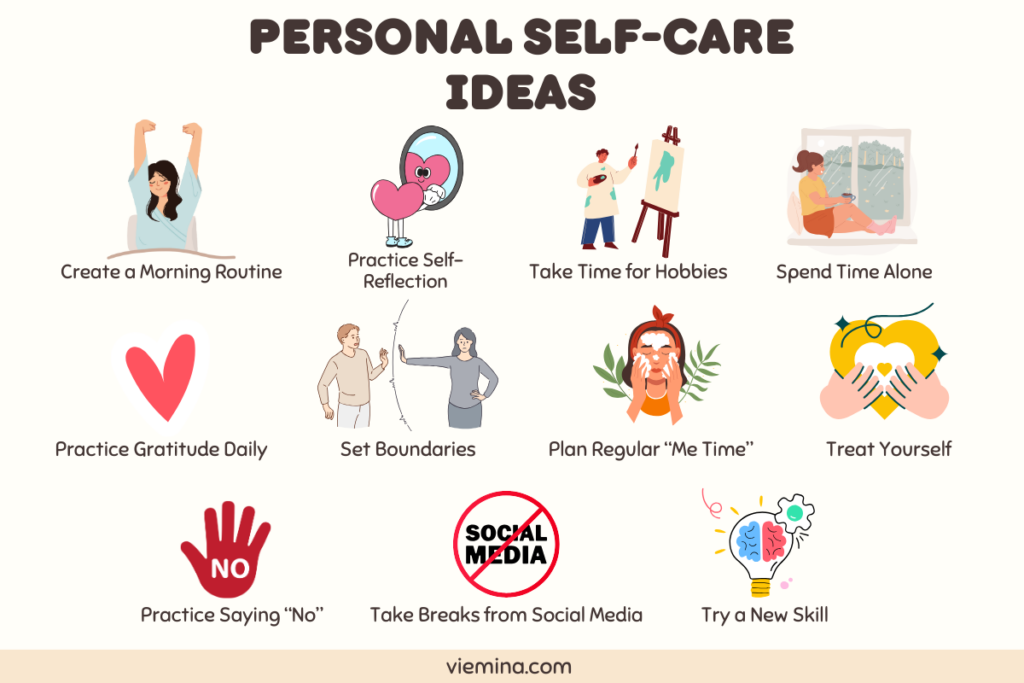
Personal self-care is about making time to focus on yourself and take care of your needs, so you can recharge and feel balanced. It includes doing things that make you happy and match your values, like reading a book, going for a walk, journaling, or taking a warm shower. Personal self-care is not just about looking after your body; it’s also about taking care of your mind and emotions. By doing things that bring you peace and happiness, personal self-care helps you become stronger, reduce stress, and improve your overall well-being.
Transform Your Routine with Beautiful Printable Self-Care Planner
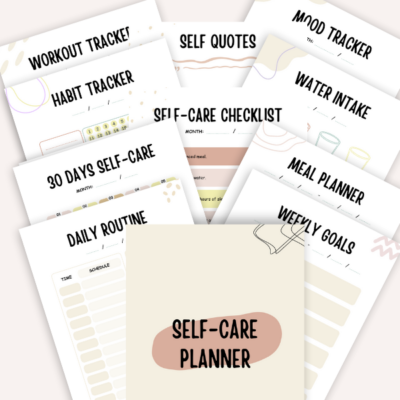
The benefits of self-care:
1-Mental clarity:
Mental clarity is all about giving your mind the care it needs to stay sharp and calm. Practicing mental self-care, like learning new things or setting aside time for relaxing activities, can greatly improve focus, reduce stress, and help you think more clearly. These habits make problem-solving easier, build resilience, and bring a more positive outlook on life. By keeping your mind active and calm, you’re setting yourself up to handle challenges with confidence and stay emotionally balanced.
Related: How To Improve Mental Clarity ? 16 Ways to Achieve It
2-A strong sense of accomplishment:
It can significantly enhance an individual’s self-esteem and overall well-being. When people set specific goals and successfully achieve them, it not only boosts their confidence but also fosters a sense of purpose and motivation. This positive reinforcement encourages them to pursue even greater challenges in the future.
3-Better Physical Health:
Physical care practices that include regular workouts, proper rest, and nutrition keep the body strong, full of energy, and functioning properly. A preventive approach like this reduces the risk of illness, improves health overall, both physically and mentally, and contributes a lot to a significant boost in mental health. It is, therefore, important to note that physical health is strongly linked to emotional stability and self-care, hence an important element of a holistic health approach.
4-Strengthened Relationships:
Social self-care is about spending quality time with people who matter to you. Building strong connections with family, friends, and communities can help reduce loneliness and make you feel more supported. Positive relationships create a solid network you can rely on, which is great for mental health and makes handling life’s challenges easier, bringing more happiness and satisfaction overall.
Related: 12 Signs Of An Unhealthy Relationship
5-Increased Inner Peace:
Engaging in spiritual self-care helps you feel more connected to yourself and others, providing a stronger sense of purpose. This practice can lead to greater inner peace, clearer thinking, and better resilience against life’s stresses. It also boosts emotional health by fostering feelings of gratitude and appreciation for both yourself and the world around you.
“Transform Your Life: Gratitude Journal in 4 Sizes”
6-Enhanced Emotional Health:
Engaging in emotional self-care helps individuals to effectively manage and articulate their emotions in a positive and constructive manner, resulting in increased emotional strength, resilience, and balance. This proactive approach to emotional well-being can lead to lowered anxiety levels, an enhanced mood, and a greater capacity to cope with life’s many challenges and difficulties, ultimately fostering a more fulfilling and balanced life.
7-Financial Security and Peace of Mind:
Engaging in financial self-care promotes smart money management practices, significantly reducing financial stress and ultimately helping build a secure future. Achieving financial well-being empowers individuals to focus on other important areas of life with less worry and anxiety, fostering a sense of stability and overall happiness.
How To Take Care of Yourself?
1-Create a routine for yourself:
Make either a daily or weekly routine that captures self-care in every aspect of your life. Through a routine, you can truly commit to self-care and make it a normal constant in your life. A good routine keeps you organized and motivated about self-care as part of major personal care.
“Unlock your most organized year yet with the 2025 Ultimate Life Planner Pro“
Related: How to Have a Good Morning Routine: 13 Powerful habits
Related: How To Create a Productive Evening Routine: 12 Steps
2-Listen to Your Body:
It is essential to pay close attention to both the physical and emotional cues that your body sends you. Rest when you are feeling tired, nourish yourself when you experience hunger, and take breaks whenever necessary to recharge. Your body knows what it needs, so be mindful of its signals and respond accordingly to maintain overall well-being and balance in your life.
3-Practice mindfulness:
Practicing mindfulness means staying present in the moment and really paying attention to your thoughts, feelings, and physical sensations. This can be a powerful way to reduce stress and anxiety while boosting your overall well-being and emotional resilience. By adding mindfulness techniques to your daily routine, you’ll start to develop a stronger awareness of your experiences, which can lead to a more balanced and fulfilling life.
4-Seek Support:
Don’t be afraid to reach out for help or support when you need it. Whether it’s from friends, family, or a professional therapist, seeking support can provide you with valuable guidance and encouragement. It can help you navigate challenges more effectively and maintain your overall well-being, allowing you to feel less isolated in times of difficulty.
Conclusion:
In conclusion, self-care is an essential practice for maintaining balance and enhancing overall well-being in our fast-paced lives. By dedicating time and attention to various types of self care, including emotional, mental, physical, social, spiritual, professional, and even financial, individuals can effectively cultivate resilience, significantly reduce stress, and improve their overall quality of life. Prioritizing self-care not only helps to build a strong foundation for personal growth but also empowers individuals to face challenges with renewed confidence and achieve a more fulfilling and meaningful life experience. Investing in self-care is a vital step toward achieving holistic wellness and happiness.
Self-Care Frequently Asked Questions
What are the most important types of self-care?
While all 9 types are important, mental, physical, and emotional self-care form the foundation. Mental self-care helps you think clearly, physical self-care maintains your body’s health, and emotional self-care helps you process feelings effectively.
How much time should I spend on self-care daily?
Start with just 10-15 minutes daily. Even small, consistent practices like a 5-minute meditation, a short walk, or journaling can make a significant difference. The key is consistency rather than duration.
Is self-care selfish?
Absolutely not. Self-care is essential for maintaining your well-being so you can show up fully for others. Think of it like the oxygen mask on airplanes—you need to secure your own first before helping others.
What’s the difference between self-care and self-indulgence?
Self-care involves activities that genuinely support your long-term well-being, while self-indulgence provides temporary pleasure without lasting benefits. Self-care builds you up; self-indulgence often leads to guilt or negative consequences.
How do I start a self-care routine when I’m overwhelmed?
Begin with one small action in one category. Choose the area causing you most stress—maybe 5 minutes of deep breathing (emotional) or decluttering one surface (environmental). Small wins build momentum.
What if I don’t have time for self-care?
Self-care doesn’t require hours. Try “micro-self-care” practices: 1-minute breathing exercises, drinking a glass of water, stretching at your desk, or listening to one uplifting song. Every minute counts.
Do I need to practice all 9 types of self-care every day?
No, that would be overwhelming! Focus on different types throughout the week. You might do physical self-care daily (like walking), but rotate through other categories like financial or professional self-care weekly or monthly.
How do I know if my self-care routine is working?
You’ll notice reduced stress levels, better sleep, improved mood, more energy, and increased patience. Track how you feel before and after self care activities to see what works best for you.
What should I do if self care feels like another chore?
Scale back! Self-care should feel nourishing, not burdensome. Choose activities you genuinely enjoy, start smaller, and remember that even 2-3 minutes counts. The goal is sustainability, not perfection.

